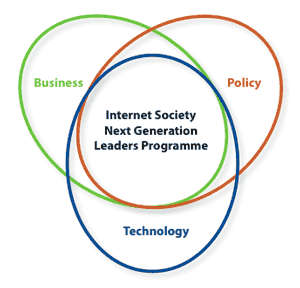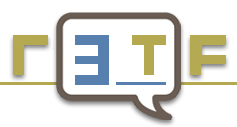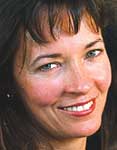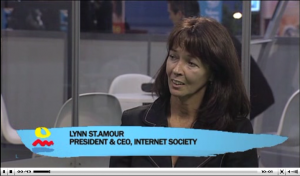GENEVA–26 February 2010–The Internet Society this week submitted a paper on “Open Inter-networking” to a Net Neutrality expert group convened by French Minister of Internet Economy, Nathalie Kosciusko MorizetI. The paper proposes a set of policy considerations derived from the need to preserve access, choice, and transparency as key to ensuring the Internet remains a platform for innovation and economic development.
isoc
ISOC Next Generation Leaders Programme – Call for Applicants
 The Internet Society (ISOC) is happy to announce a new programme beginning in 2010: the ISOC Next Generation Leaders (NGL) programme.
The Internet Society (ISOC) is happy to announce a new programme beginning in 2010: the ISOC Next Generation Leaders (NGL) programme.
The NGL was officially launched 6 October 2009 at a youth forum lunch during the ITU Telecom World week in Geneva. The programme is aimed at emerging talents across the globe, between the ages of 20 and 40, and is a unique blend of coursework and practical experience to help prepare young professionals from around the world to become the next generation of Internet technology, policy, and business leaders. More information on the programme, including an information brochure available in the six official UN languages, can be found at http://www.isoc.org/leaders .
Continue reading
NEW TECHNIQUE DEVELOPED TO IDENTIFY CHEATING IN ONLINE GAMES
 WASHINGTON, D.C., USA and GENEVA, SWITZERLAND–2 February 2010–In a paper scheduled to be presented at the upcoming 17th Annual Network and Distributed System Security Symposium (NDSS 2010), Darrell Bethea, Robert Cochran, and Michael Reiter of the University of North Carolina, Chapel Hill describe a technique they have developed to identify cheating in the rapidly growing, multi-billion dollar industry of online gaming which includes titles such as World of Warcraft. The full paper will be published in the NDSS Proceedings.
WASHINGTON, D.C., USA and GENEVA, SWITZERLAND–2 February 2010–In a paper scheduled to be presented at the upcoming 17th Annual Network and Distributed System Security Symposium (NDSS 2010), Darrell Bethea, Robert Cochran, and Michael Reiter of the University of North Carolina, Chapel Hill describe a technique they have developed to identify cheating in the rapidly growing, multi-billion dollar industry of online gaming which includes titles such as World of Warcraft. The full paper will be published in the NDSS Proceedings.
Cheating through the use of non-sanctioned client software compromises the gaming experience for players and undermines the revenue of game developers and operators. The approach outlined in the paper to be presented at NDSS 2010 could help ensure the integrity of the online gaming experience by providing an automated, alternative approach to current, manually programmed methods of identifying game cheats. The described approach is server-based and does not increase the required bandwidth, often a critical expense for game operators.
Continue reading
Real-Time Text Taskforce (R3TF) promotes text equivalent to voice
 OSS, NETHERLANDS and GENEVA, SWITZERLAND -1 February 2010: The Real-Time Text Taskforce (R3TF) today announced the establishment of an independent, open forum and centre of excellence where engineers, experts, motivated individuals, companies and organisations can work together to advance the adoption of Real-Time Text (RTT), a character-by-character streaming technology that provides immediacy for text-based communications, similar to what the telephone service provides for voice.
OSS, NETHERLANDS and GENEVA, SWITZERLAND -1 February 2010: The Real-Time Text Taskforce (R3TF) today announced the establishment of an independent, open forum and centre of excellence where engineers, experts, motivated individuals, companies and organisations can work together to advance the adoption of Real-Time Text (RTT), a character-by-character streaming technology that provides immediacy for text-based communications, similar to what the telephone service provides for voice.
Continue reading
Season’s greetings from Raúl Echeberría
 As Chair of Internet Society Board of Trustees, I would like to take this opportunity to offer my best wishes for a wonderful New Year to Members, Chapters, partners, and friends around the world.
As Chair of Internet Society Board of Trustees, I would like to take this opportunity to offer my best wishes for a wonderful New Year to Members, Chapters, partners, and friends around the world.
As a community joined by a vision of the Internet’s potential to foster global innovation and to benefit individual lives, I believe the past year provides us many reasons for confidence. Our collective efforts have helped make the Internet more accessible to an increasing number of people around the world. We have helped promote the adoption of technologies that are at the core of the Internet’s continued development.
Perhaps most importantly, we have helped those beyond our community understand that openness and transparency are not just chance features of today’s Internet, but properties intrinsic to its creation and continuing evolution, and that they must be preserved.
Thus, I look forward with much optimism to working with you in 2010 as we continue to advance the cause of an Internet for everyone.
Most sincerely,
Raúl Echeberría Continue reading
2009 Wrap-up from ISOC President Lynn St Amour
 Thanks for an Extraordinary Year of Achievements
Thanks for an Extraordinary Year of Achievements
from Lynn St.Amour, President and CEO of ISOC
Dear Members, Friends, and Colleagues,
The end of 2009 is here – and what a year it has been. The Internet Society continued to prosper in 2009, the results of our work reaching wider and deeper than ever before. So it is a pleasure to extend my sincere gratitude to all of you whose combined efforts, energy, and dedication have made this such a great year.
We often use the term “Internet community” and, looking back at the achievements of this year, it is clear that these are truly the result of a strong, committed community pulling together around shared values and principles.
It is impossible to list here all of the Internet Society’s achievements from such a busy and productive year, but I would like to single out a few highlights.
Continue reading
Internet Society Funds Projects to Expand Internet Access and Use
Community Grants Programme’s 10th round helps extend Internet’s reach and promote key technologies
[Washington, D.C., USA and Geneva, Switzerland–23 December 2009] The Internet Society (ISOC) today announced it is funding community-based projects around the world to promote Internet access and education in underserved communities, to track and highlight the deployment of IPv6–the next generation protocol key to the Internet’s continued growth, and to address issues such as online identity theft.
“These awards extend the Internet Society Community Grants Programme’s five-year tradition of providing tangible support for efforts by the Internet Society’s global community in realizing our shared vision that the Internet can be used to improve the life of people in all parts of the world,” said Jon McNerney, Chief Operating Officer of the Internet Society. “As the Internet becomes a larger part of everyday life in many parts of the world, it is even more important that we enable its use by the billions of people on every continent who today are without access.” Continue reading
Call for Nominations for the Internet Society Board of Trustees
 10 December 2009 – The ISOC Nominations Committee seeks statements of interest from individuals who wish to join the Board of Trustees.
10 December 2009 – The ISOC Nominations Committee seeks statements of interest from individuals who wish to join the Board of Trustees.
In 2010, three positions on the Board of Trustees are open for election. Two Trustees will be elected by ISOC Organizational Members and one by ISOC Chapters. The Trustee positions are 3-year terms that start June 2010 and expire June 2013.
Internet Bandwidth Growth: Dealing with Reality
Internet Futures Scenarios
 Recently, senior staff at the Internet Society engaged in a scenario planning exercise to reveal plausible courses of events that could impact the health of the Internet in the future. The results of the exercise were subsequently reviewed with the Internet Society Board of Trustees who have, in turn, thrown it to the chapters for comment.
Recently, senior staff at the Internet Society engaged in a scenario planning exercise to reveal plausible courses of events that could impact the health of the Internet in the future. The results of the exercise were subsequently reviewed with the Internet Society Board of Trustees who have, in turn, thrown it to the chapters for comment.
Scenarios always start from a question about the future. In this case, the focal question for the exercise was: “Will the world embrace or resist the open Internet model?” with a second-level question to narrow the field: “What model will be more successful? Command and control? Or, distributed and decentralized?”
ISOC publishes 2008 Annual & Chapter Reports
 The Internet Society (ISOC) has published its Annual and Chapter reports for 2008. Both are available online.
The Internet Society (ISOC) has published its Annual and Chapter reports for 2008. Both are available online.
ISOC Chapters discuss IPv6 transition
 On September 22 2009 ISOC Chapters held an E-meeting to discuss two new briefings on IPv6 deployment.
On September 22 2009 ISOC Chapters held an E-meeting to discuss two new briefings on IPv6 deployment.
Amongst the conclusions were that, for competitive advantage and business continuity, stakeholders – rather than sitting on their hands waiting for a ‘killer app’ or an IPv4 ‘crisis’ – need to institute a robust policy of factoring IPv6 deployment into network ‘refresh’ cycles. Chapters can help by raising awareness. Governments, in particular, can be prevailed upon to assist the process by leading by example. Addressing is as important as broadband, both are important enablers of innovation and growth.
Continue reading
Lynn St. Amour interviewed at ITU Telecom World
 Interviewed at ITU Telecom World 2009, Lynn St. Amour, President and CEO of the Internet Society, explains to Ian Scales why, despite some telco claims to the contrary, the Internet model is not ‘broken’ and needs no radical surgery to keep it relevant and technically fit for purpose. Those who want to change the fundamental Internet rules need to re-think their approach and ‘lean in’ to support and prosper from its open development environment.
Interviewed at ITU Telecom World 2009, Lynn St. Amour, President and CEO of the Internet Society, explains to Ian Scales why, despite some telco claims to the contrary, the Internet model is not ‘broken’ and needs no radical surgery to keep it relevant and technically fit for purpose. Those who want to change the fundamental Internet rules need to re-think their approach and ‘lean in’ to support and prosper from its open development environment.
Continue reading
The Seven Stages of IPv6 Adoption
 As part of the IETF 74 meeting in San Francisco, on 24 March the Internet Society organized a panel of experts from industry and other thought leaders on the to discuss the pressing need to adopt Internet Protocol version 6 (IPv6) to ensure the continued growth of the Internet as a platform for innovation.
As part of the IETF 74 meeting in San Francisco, on 24 March the Internet Society organized a panel of experts from industry and other thought leaders on the to discuss the pressing need to adopt Internet Protocol version 6 (IPv6) to ensure the continued growth of the Internet as a platform for innovation.
IPv6 is the next generation Internet Protocol (IP) standard intended to supplement, and eventually replace, the IPv4 protocol most Internet services use today. To help ensure the continued rapid growth of the Internet as a platform for innovation, IPv6 tackles some of IPv4’s shortcomings – most notably a limited amount of remaining addresses. While the technical foundations of IPv6 are well established, significant work remains to deploy and begin using IPv6 capabilities.
Because IPv6 is central to the continued growth and stability of the Internet, the Internet Society is working with its members and other organizations to promote its deployment by sharing information and helping to build the required operational capability among the Internet community.
More information, including panelist bios and slides: http://www.isoc.org/isoc/conferences/ipv6panel/
Continue reading
IETF Fellowship application deadline extended to Jan 5 2009
 The Internet Society is seeking applications for the next round of the ISOC Fellowship to the IETF program. The program offers engineers from developing countries fellowships that fund the cost of attending an Internet Engineering Task Force (IETF) meeting.
The Internet Society is seeking applications for the next round of the ISOC Fellowship to the IETF program. The program offers engineers from developing countries fellowships that fund the cost of attending an Internet Engineering Task Force (IETF) meeting.
The IETF is the Internet’s premier standards-making body, responsible for the development of protocols used in IP-based networks. IETF participants represent an international community of network designers, operators, vendors, and researchers involved in the technical operation of the Internet and the continuing evolution of Internet architecture.
